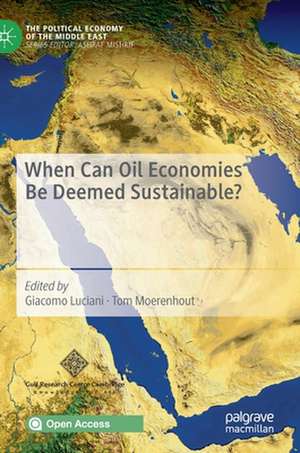When Can Oil Economies Be Deemed Sustainable?: The Political Economy of the Middle East
Editat de Giacomo Luciani, Tom Moerenhouten Limba Engleză Hardback – oct 2020
This open access book questions the stereotype depicting all Gulf (GCC) economies as not sustainable, and starts a critical discussion of what these economies and polities should do to guarantee themselves a relatively stable future.
Volatile international oil markets and the acceleration of the energy transition has challenged the notion that oil revenues are sufficient to sustain oil economies in the near to medium term.
But what is the meaning of economic sustainability? The book discusses the multiple dimensions of the concept: economic diversification, continuing value of resources, taxation and fiscal development, labor market sustainability, sustainable income distribution, environmental sustainability, political order (democracy or authoritarianism) and sustainability, regional integration.
The overarching message in this book is that we should move on from the simplistic branding of the Gulf economies as unsustainable and tackle the details of which adaptations they might need to undertake.
| Toate formatele și edițiile | Preț | Express |
|---|---|---|
| Paperback (1) | 271.01 lei 38-44 zile | |
| Springer Nature Singapore – 10 oct 2020 | 271.01 lei 38-44 zile | |
| Hardback (1) | 431.56 lei 6-8 săpt. | |
| Springer Nature Singapore – oct 2020 | 431.56 lei 6-8 săpt. |
Preț: 431.56 lei
Nou
Puncte Express: 647
Preț estimativ în valută:
82.58€ • 86.40$ • 68.60£
82.58€ • 86.40$ • 68.60£
Carte tipărită la comandă
Livrare economică 02-16 aprilie
Preluare comenzi: 021 569.72.76
Specificații
ISBN-13: 9789811557279
ISBN-10: 9811557276
Pagini: 362
Ilustrații: XXI, 365 p. 71 illus.
Dimensiuni: 148 x 210 x 29 mm
Greutate: 0.66 kg
Ediția:1st ed. 2021
Editura: Springer Nature Singapore
Colecția Palgrave Macmillan
Seria The Political Economy of the Middle East
Locul publicării:Singapore, Singapore
ISBN-10: 9811557276
Pagini: 362
Ilustrații: XXI, 365 p. 71 illus.
Dimensiuni: 148 x 210 x 29 mm
Greutate: 0.66 kg
Ediția:1st ed. 2021
Editura: Springer Nature Singapore
Colecția Palgrave Macmillan
Seria The Political Economy of the Middle East
Locul publicării:Singapore, Singapore
Cuprins
1. Framing the economic sustainability of oil economies.- 2. Fiscal sustainability, the labour market, and growth in Saudi Arabia.- 3. Outlook for producer economies.- 4. Economic diversification in Arab oil-exporting countries in the context of peak oil and the energy transition.- 5. Economic Diversification and Sustainable Development of GCC Countries.- 6. Redefining economic sustainability in resource-rich states: Comparative lessons.- 7. Fuel and electricity reform for economic sustainability in the Gulf.- 8. Fiscal sustainability and hydrocarbon endowment per capita in the GCC.- 9. GCC fiscal reforms and labor market policies.- 10. Economic diversification and job creation in the Arab Gulf countries: Applying a value chain perspective.- 11. Climate strategy for producer countries: The case of Saudi Arabia.- 12. The sustainability of GCC development under the new global oil order.
Notă biografică
Giacomo Luciani teaches at the Graduate Institute of International and Development Studies in Geneva, and at the Paris School of International Affairs, Sciences Po in Paris. His edited book “The Rentier State” (1987, with H. Beblawi), is frequently cited as reference for the concept. His latest edited book, “Combining Economic and Political Development” (2017), discusses economic policies to support democratic transitions and is available in open access.
Tom Moerenhout teaches at Columbia University’s School of International and Public Affairs and is a scholar at SIPA’s Center on Global Energy Policy. He is involved as a practitioner on energy sector and structural reforms through his work as a consultant for the World Bank, International Institute for Sustainable Development and Bill & Melinda Gates Foundation, among others.
Textul de pe ultima copertă
This open access book questions the stereotype depicting all Gulf (GCC) economies as not sustainable, and starts a critical discussion of what these economies and polities should do to guarantee themselves a relatively stable future.
Volatile international oil markets and the acceleration of the energy transition has challenged the notion that oil revenues are sufficient to sustain oil economies in the near to medium term.
But what is the meaning of economic sustainability? The book discusses the multiple dimensions of the concept: economic diversification, continuing value of resources, taxation and fiscal development, labor market sustainability, sustainable income distribution, environmental sustainability, political order (democracy or authoritarianism) and sustainability, regional integration.
The overarching message in this book is that we should move on from the simplistic branding of the Gulf economies as unsustainable and tackle the details of which adaptations they might need to undertake.
Giacomo Luciani teaches at the Graduate Institute of International and Development Studies in Geneva, and at the Paris School of International Affairs, Sciences Po in Paris. His edited book The Rentier State (1987, with H. Beblawi), is frequently cited as reference for the concept. His latest edited book, Combining Economic and Political Development (2017), discusses economic policies to support democratic transitions and is available in open access.
Tom Moerenhout teaches at Columbia University’s School of International and Public Affairs and is a scholar at SIPA’s Center on Global Energy Policy. He is involved as a practitioner on energy sector and structural reforms through his work as a consultant for the World Bank, International Institute for Sustainable Development and Bill & Melinda Gates Foundation, amongothers.
Caracteristici
This is an Open Access Book The first systematic discussion of what makes an oil economy sustainable Debunks commonly held notions of what makes an oil economy sustainable Highlights which oil economies are making progress towards sustainability Questions if all oil economies necessarily doomed to fail










